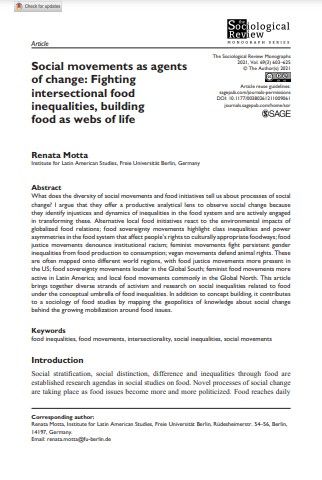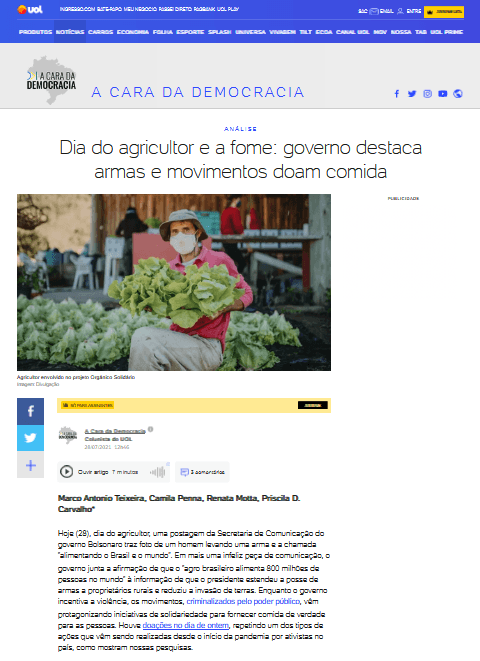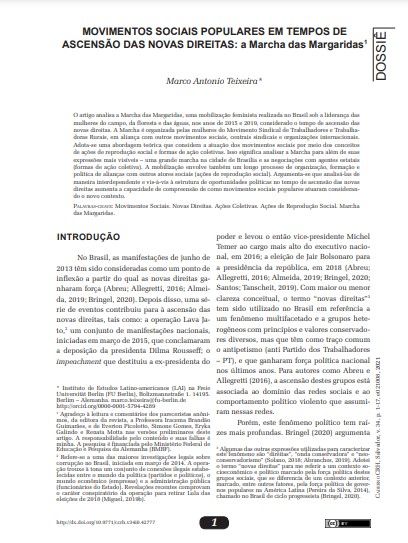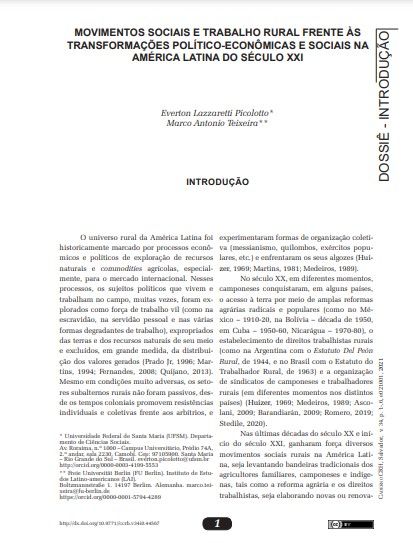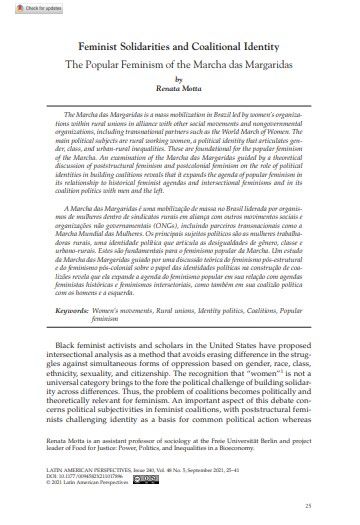Roman & Littlefield Publishers • 2021
Allowing Rural Difference to Make a Difference: The Brazilian Marcha das Margaridas
Abstract
The article „Allowing Rural Difference to Make a Difference: The Brazilian Marcha das Margaridas“ by Renata Motta and Marco Antonio Teixeira was published as a book chapter and contribution to the anthology Cross-Border Solidarities in Twenty-First Century Contexts: Feminist Perspectives and Activist Practices. This book, which was edited by Janet Conway, Pascale Dufour, and Dominique Masson, contains a selection of papers that look at social movements and global solidarity.
The Sociological Review • 2021
Social movements as agents of change: Fighting intersectional food inequalities, building food as webs of life
Abstract
Was sagt uns die Vielfalt der sozialen Bewegungen und Lebensmittelinitiativen über Prozesse des sozialen Wandels? Ich behaupte, dass sie eine produktive analytische Linse zur Beobachtung des sozialen Wandels bieten, weil sie Ungerechtigkeiten und Dynamiken von Ungleichheiten im Lebensmittelsystem identifizieren und sich aktiv für deren Veränderung einsetzen. Alternative lokale Lebensmittelinitiativen reagieren auf die Umweltauswirkungen globalisierter Lebensmittelbeziehungen; Bewegungen für Ernährungssouveränität weisen auf Klassenungleichheiten und Machtasymmetrien im Lebensmittelsystem hin, die das Recht der Menschen auf kulturell angemessene Ernährung beeinträchtigen; Bewegungen für Ernährungsgerechtigkeit prangern institutionellen Rassismus an; feministische Bewegungen bekämpfen anhaltende geschlechtsspezifische Ungleichheiten von der Lebensmittelproduktion bis zum Konsum; vegane Bewegungen setzen sich für Tierrechte ein. Diese Bewegungen werden oft verschiedenen Weltregionen zugeordnet, wobei die Bewegungen für Ernährungsgerechtigkeit eher in den USA, die Bewegungen für Ernährungssouveränität eher im globalen Süden, die feministischen Bewegungen für Lebensmittel eher in Lateinamerika und die Bewegungen für lokale Lebensmittel eher im globalen Norden vertreten sind. In diesem Artikel werden verschiedene Stränge des Aktivismus und der Forschung über soziale Ungleichheiten im Zusammenhang mit Lebensmitteln unter dem Begriff der Nahrungsmittelungleichheiten zusammengefasst. Neben der Entwicklung eines Konzepts leistet er einen Beitrag zur Soziologie der Ernährungswissenschaft, indem er die geopolitischen Aspekte des Wissens über den sozialen Wandel aufzeigt, die hinter der wachsenden Mobilisierung zu Ernährungsfragen stehen.
UOL • 2021
Dia do agricultor e a fome: governo destaca armas e movimentos doam comida
Caderno CRH • 2021
Movimentos populares em tempos de ascensão das novas direitas: a Marcha das Margaridas
Abstract
O artigo analisa a Marcha das Margaridas, uma mobilização feminista realizada no Brasil sob a liderança das mulheres do campo, da floresta e das águas, nos anos de 2015 e 2019, considerado o tempo de ascensão das novas direitas. A Marcha é organizada pelas mulheres do Movimento Sindical de Trabalhadores e Trabalhadoras Rurais, em aliança com outros movimentos sociais, centrais sindicais e organizações internacionais. Adota-se uma abordagem teórica que considera a atuação dos movimentos sociais por meio dos conceitos de ações de reprodução social e formas de ação coletivas. Isso significa analisar a Marcha para além de suas expressões mais visíveis – uma grande marcha na cidade de Brasília e as negociações com agentes estatais (formas de ação coletiva). A mobilização envolve também um longo processo de organização, formação e política de alianças com outros atores sociais (ações de reprodução social). Argumenta-se que analisá-las de maneira interdependente e vis-à-vis à estrutura de oportunidades políticas no tempo de ascensão das novas direitas aumenta a capacidade de compreensão de como movimentos sociais populares atuaram considerando o novo contexto.
This article analyses the Marcha das Margaridas , a feminist mobilisation spearheaded by women from the Brazilian Union of Rural Workers in alliance with other social movements, trade unions, and international organisations in the years 2015 and 2019 – considered to be the time of the rise of the new right. From a theoretical approach that regard the performance of social movements based on the concepts of actions of social reproduction and forms of collective action, we analyse the Marcha beyond its most visible expression – that is, a large street protest in the city of Brasilia, and the negotiations with state agents (forms of collective action). Rather, we understand this movement as also involving a long process of organisation, mobilisation, political formation activities, and politics of alliances with other social actors (actions of social reproduction). By analysing them interdependently and vis-à-vis the political opportunity structures at the time of the rise of the new right, we will better understand how social movements acted considering the new context.
Caderno CRH • 2021
Movimentos sociais e trabalho rural frente às transformações político-econômicas e sociais na América Latina do séc. XXI
Latin American Perspectives • 2021
Feminist Solidarities and Coalitional Identity: The Popular Feminism of the Marcha das Margaridas
Abstract
The Marcha das Margaridas is a mass mobilization in Brazil led by women’s organizations within rural unions in alliance with other social movements and nongovernmental organizations, including transnational partners such as the World March of Women. The main political subjects are rural working women, a political identity that articulates gender, class, and urban-rural inequalities. These are foundational for the popular feminism of the Marcha. An examination of the Marcha das Margaridas guided by a theoretical discussion of poststructural feminism and postcolonial feminism on the role of political identities in building coalitions reveals that it expands the agenda of popular feminism in its relationship to historical feminist agendas and intersectional feminisms and in its coalition politics with men and the left.






